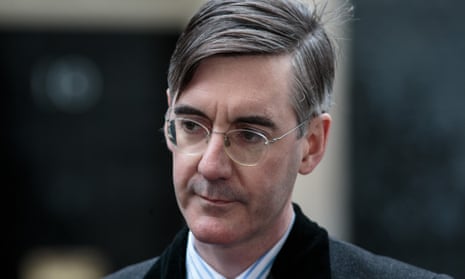A draft plan for Brexit to be proposed by Tory Eurosceptics includes significant tax cuts, as well as more eyebrow-raising ideas such as a new military expeditionary force to defend the Falklands and a domestic-built missile defence system, according to a leaked version.
The document from the European Research Group (ERG), which corrals the bulk of the hard Brexit-supporting Conservative MPs, also argues for a so-called invisible customs frontier on the Irish border, with any checks carried out away from the frontier.
After extracts of the leak were carried by several Sunday newspapers, the ERG’s head, Conservative MP Jacob Rees-Mogg, said it was an early draft, mainly focused on assuaging worries about how an exit could see the UK reliant on World Trade Organisation (WTO) terms.
Amid a concerted effort by the ERG and allied groups to derail Theresa May’s Chequers plan, the group’s counter-proposals are intended to refute the charge that Tory Eurosceptics have no coherent ideas of their own.
Quick GuideWill the Chequers agreement survive?
Show
Who dislikes the Chequers agreement and why?
Noisiest in their opposition are Tory Brexiters, not least David Davis and Boris Johnson, both of whom quit the cabinet in protest. They argue that the promise to maintain a common rulebook for goods and other continued alignment will mean a post-Brexit UK is tied to the EU without having a say on future rules, rather than being a free-trading independent nation.
Labour has also disparaged the proposal, expressing deep scepticism about the so-called facilitated customs arrangement system.
What about the EU?
Brussels has sought to stay positive, but has deep concerns about elements of the plan viewed as overly pick-and-mix, and thus potentially incompatible with EU principles.
Michel Barnier, the EU’s chief Brexit negotiator, says he opposes both the customs plan and the idea of alignment for goods. He also makes plain his contention that the Chequers plan contains no workable idea for the Ireland-Northern Ireland border.
But at the same time the EU has been careful to not entirely dismiss the proposals, raising the possibility it could accept some adapted version.
Who supports the agreement?
Officially, May and her cabinet, though even here the backing can seem lukewarm at times. Asked about Chequers, the home secretary, Sajid Javid, said it was the government’s plan “right now”, indicating alternative ideas could be considered.
Is it doomed?
Even May’s allies concede it will be a hugely difficult task to get the plan through parliament. Damian Green, the PM’s close friend and former de fact deputy, described the process as “walking a narrow path with people chucking rocks at us from both sides”.
On the remain side of the Conservatives, the former education secretary Justine Greening called the Chequers plan “more unpopular than the poll tax”, saying May should start again from scratch.
If anything can save the plan – and it’s an outside shot – it will be a combination of the hugely tight timetable and the fact that, as yet, no one else has yet produced a plan with a better chance of being accepted by parliament.
What happens next?
On 20 September, an informal gathering in Salzburg, Austria, will provide a snapshot of current EU thinking. Then, 10 days later, the Conservative conference could show the Chequers plan is holed below the waterline.
If it survives these tests, the proposals will then reach the crucial EU summit Brussels on 18 October, with something final needed, at the very latest, in the next two months. PETER WALKER
As expected, the reported leaked version would see the UK propose a Canada-style trade deal with the EU, with none of the alignment or common rules proposed by Chequers. If that was rejected, the paper says, the UK would leave without a deal, on WTO terms.
A no-deal Brexit would mean the estimated £39bn final payment to Brussels would instead be largely used for the NHS, the document argues. Another “Brexit bonus” would come from cuts to income and capital gains tax, business rates and stamp duty.
Less expected was a plan to create a rapid reaction military expeditionary force to allow swift deployment to protect places such as the Falkland islands.
There is also a proposal for a defence planning to include “the insurance of a nuclear missile shield to deter aggression”, the Mail on Sunday said, an idea seemingly based on the US strategic defence initiative, commonly known as “star wars”.
The bulk of scrutiny of any final ERG plan is likely to focus on plans to prevent a hard Irish border after Brexit. The leaked reports give few details beyond the idea of carrying out checks away from the border.
Rees-Mogg told the Mail: “That was an early draft. The key thing which the papers will address is that there is nothing to be concerned about the UK trading with the EU on WTO terms.”
On Tuesday, Rees-Mogg is due to speak at an event arguing for the economic benefits of a no-deal Brexit. It is organised by the Economists for Free Trade group, which has repeatedly argued that the UK economy would thrive on WTO terms.
The UK, he said, has nothing to fear from trading on WTO terms. “Let Brexit mean Brexit and let us flourish under the auspices of the WTO,” he added.
